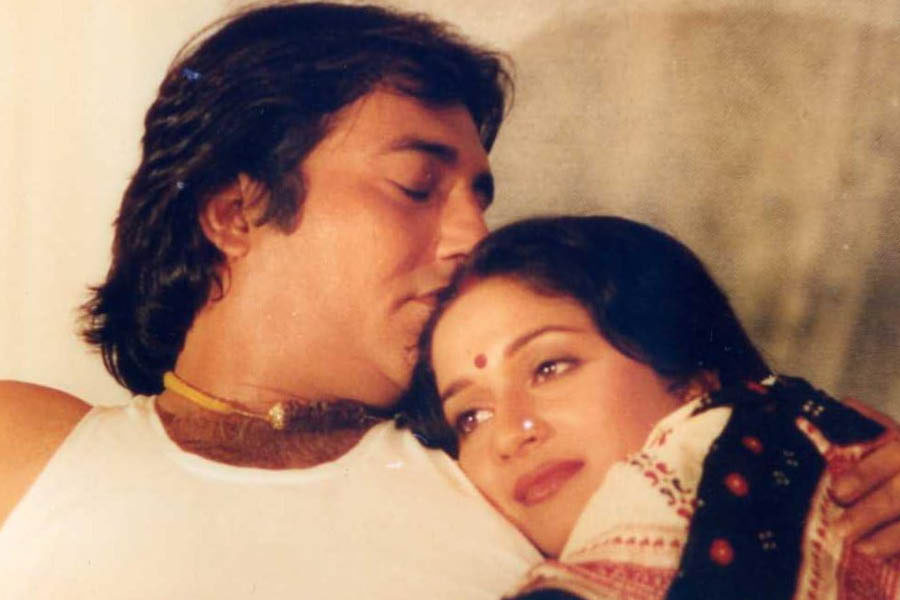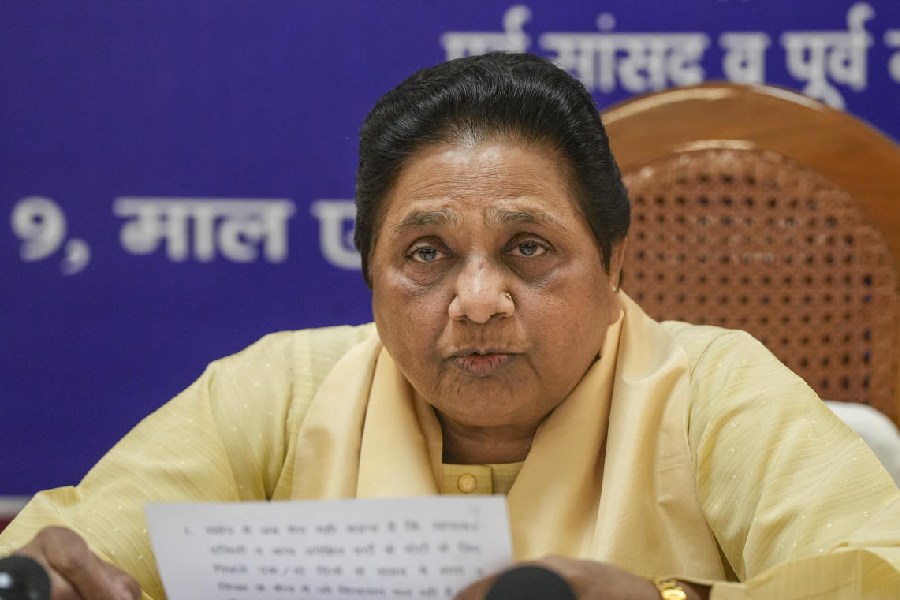Sarkari Mehman, Do Shikari, Khoon Ki Pukaar, Khoon Ka Badla Khoon, Yuvraj, Chor Sipahee, Adha Din Adhee Raat, Lagaam, Maha Badmaash…. Do any of these films ring a bell? Even for those who sing eulogies for the star-actor who came close to being anointed Hindi cinema’s top star of the 1970s, the only one who challenged Amitabh Bachchan’s number one status, it might come as a surprise that Vinod Khanna’s filmography is littered with turkeys like these.
It did to me when my brother sent me a grab from Garam Khoon with a message: ‘Remember?’ I did, but only because I am a Kishore Kumar fan and the film rekindled memories of the song ‘Tu jahan main wahan’, rendered with gusto by Kishore. That, in itself, is a rarity in Vinod Khanna’s oeuvre: a film remembered for a song.
He is one of the rare stars of Hindi cinema who made it big without a musical hit to his credit. Yes, he had Qurbani. And he had the odd popular songs in Lahu Ke Do Rang (the film flopped), Aap Ki Khatir (‘Bambai se se aaya mera dost’ was tagged on to the film post-release, after the song caught on), Inkaar (‘Mungda’ was a Helen item number) and a few others.
He is also one of the rare stars who has almost no memorable dialogue to his credit across his films, unlike stars like Shatrughan Sinha (who had killer lines in the film, Mere Apne, that brought attention to both of them), Dharmendra, not to mention Amitabh Bachchan. Barring ‘Bachche tum jis school me padhte ho ham uske headmaster rah chuke hain (in Haath Ki Safai — not surprising that this was scripted by Salim-Javed), the few sequences from his filmography that have endured for their dialogues are, without exception, those starring Amitabh Bachchan. It is those films that defined Bachchan’s stardom — Amar Akbar Anthony, Parvarish, Hera Pheri — that people most remember Vinod Khanna for.
Watching him in a few films of the ’70s over the last week, I was, as always, charmed by his looks, his debonair presence, and his extraordinary ability to hold your eye in the middle of the banality that these films epitomised. Garam Khoon, Khuda Kasam, Jail Yatra, and Daulat — I enjoyed them immensely. However, I also realised that the primary reason I relished going back to them was ‘nostalgia’ for a much simpler time. That simple message from my brother, ‘Remember?’ brought back so many memories of those visits to the theatre with our parents that even before I revisited the films, I was inclined to feel fond of them.
I also couldn’t help but marvel at how the star came to be regarded as one of the best in the industry, riding on films that not only flopped miserably but were, even by the standards of the era, BAD. And how his reputation as an actor rests on just a handful of films. To his credit, he owned these films without the crutches of hit songs shot on him, big banners and directors, or memorable dialogues.
Mera Gaon Mera Desh (1971)
Vinod Khanna’s early career was highlighted by a string of negative roles that often became more popular than that of the hero. These included hits like Aan Milo Sajna and Anokhi Ada. However, the film that garnered him recognition was this dacoit saga, often regarded as the precursor to Sholay, where Vinod Khanna not only held his own against Dharmendra but often put the star to shame with his terrifying portrayal as the dacoit Jabbar Singh. Dharmendra and Vinod Khanna would team up years later, most memorably in The Burning Train, and then, after Khanna’s return to cinema post his Osho years, in films like Batwara, Kshatriya (both directed by J.P. Dutta) and the abysmal Farishtay (where both were parodies of their images). But nothing holds a candle to the encounter between the two in this Raj Khosla-directed gritty drama.
Mere Apne (1971) / Achanak (1973)
One major filmmaker of the era who gave Vinod Khanna some meaty offbeat roles is Gulzar. It is these two films that enabled Vinod Khanna to transition from the villain to the hero. In Mere Apne, which incidentally also proved instrumental in Shatrughan Sinha’s stardom, Vinod Khanna is terrific as a student leader with a dead-end future, caught in a vicious cycle of violence.
Achanak, adapted from K.A. Abbas’s story ‘The Thirteenth Victim’, is another rarity among the Hindi films of the time — one without songs. Vinod Khanna plays an army man who discovers his wife’s having an affair and kills both her and her lover. He hands himself over to the police but soon flees captivity. The film traces this manhunt as Gulzar directs a taut thriller that showcases a fine performance by Vinod Khanna.
Imtihan (1974)
If this rather creaky adaptation of To Sir with Love — imagine Bindu and Ranjeet as college students — is fondly recalled after 50 years, it is because of Vinod Khanna (those sideburns and those oversized glasses) and that evergreen Kishore song ‘Ruk jaana nahin’. For the rest, the film is as ridiculously bad as any film of the era. However, it is one of Vinod Khanna’s rare solo hits and also one that steered clear of his action star image.
Inkaar (1977)
For my money, this is the Vinod Khanna film. Raj Sippy’s filmmaking debut is one of the most stylish thrillers of Hindi cinema ever. Inkaar is obviously a rip-off of Akira Kurosawa’s High and Low, and though it may be blasphemous to say so, Inkaar is the more enjoyable of the two. And that’s primarily for one reason: The original does not have Vinod Khanna! As a police officer investigating the kidnapping of a child, the star is in great form here, and barring possibly Qurbani, has never looked this dishy. For its time, the film was quite accomplished technically and had Amjad Khan in one of his memorable turns as a villain, while Helen scorched the screen with ‘Mungda’. Kurosawa had none of these!
Shaque (1977)
In the year that Vinod Khanna zoomed to the top, giving Amitabh Bachchan a run for his money in Amar Akbar Anthony and Parvarish, he was also part of this underrated marital thriller. Again, working with first-time filmmakers Aruna Raje and Vikas Desai, Vinod Khanna is brilliant as a man whose wife suspects him of murder. His bespectacled, moustachioed husband act, his lovemaking scene and a swimsuit moment on the beach became the talk of the town.
Qurbani (1980)
This must remain one of the great mysteries of Hindi film stardom — why would a star delivering the biggest hit of the year turn his back on all of it for a spiritual quest? Despite the fact that the film appears dangerously moth-eaten after all these years, it will remain part of Hindi film folklore for one reason alone. That its star gave it all up when he had the world for the asking. Qurbani was a tsunami of a hit, and though Nazia Hassan, Biddu, and Zeenat Aman jiving to ‘Aap jaisa koi’ could rightfully claim credit for the magnitude of the hit, there was no doubt that it was Vinod Khanna who provided the killer punch. Few actors have looked as desirable as he did, standing on the beach against the backdrop of the setting sun, with ‘Hum tumhe chahte hai aise’ playing on the soundtrack.
Insaaf / Satyamev Jayate (1987)
Even as the Hindi film industry entered a tough phase with Amitabh Bachchan’s sabbatical and video piracy playing havoc with the box office, Vinod Khanna emerged as the new big hope. He returned from his stint with Osho to rapturous audiences with Insaaf. Mukul Anand’s script was as chaotic and senseless as always — with Vinod Khanna’s character going from a lawyer to a police officer to a gangster — but it did not matter. I was witness to the crowds that thronged the theatres and barring Bachchan’s Shahenshah the next year, I had not seen anything wilder right through the ’80s.
His follow-up, Satyamev Jayate, directed by Raj Sippy, too scored big with Vinod Khanna delivering a knock-out performance as an embittered cop. Hindi cinema had found its new messiah, or so it seemed.
Dayavan (1988)
Unfortunately, Vinod Khanna could never replicate the success of these two films. And only a year later, the huge debacle of Dayavan dealt a body blow to his stardom. However, that does not in any way take away from the star’s superlative performance — in my view, his finest — in this larger-than-life reworking of Nayakan. The audiences, which had greeted something as ridiculous as Insaaf with such enthusiasm, seemed cold towards the brilliant makeover the star attempted with his character. Vinod Khanna never recovered from the failure of Dayavan and gave himself up to senseless potboilers.
Lekin… (1991)
In this bleak final phase of his career, Vinod Khanna was a pale shadow of his ’70s avatar. Just a Rihaee (1988, Aruna Raje’s trenchant take on the male of the species) or a Chandni (1989) provided some glimpses of the actor, now lost as a star too. It was left to Gulzar, with whom the actor had embarked on his stardom almost 20 years ago, to provide him with a film and a character that he could dig his teeth into. Though remembered today more for its brilliant music and Dimple Kapadia’s performance, Vinod Khanna proved his credentials as an actor with his restrained portrayal of a man coming to terms with himself and his scientific scepticism when faced with the supernatural. If any proof were needed about how filmmakers had failed to tap into his potential as an actor, Lekin… was it.










